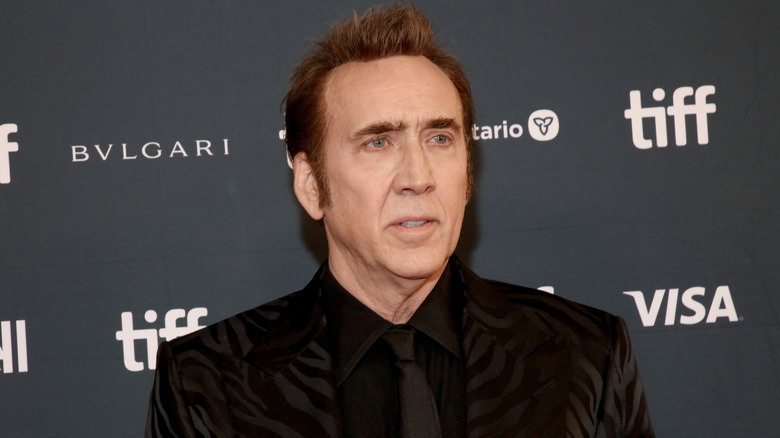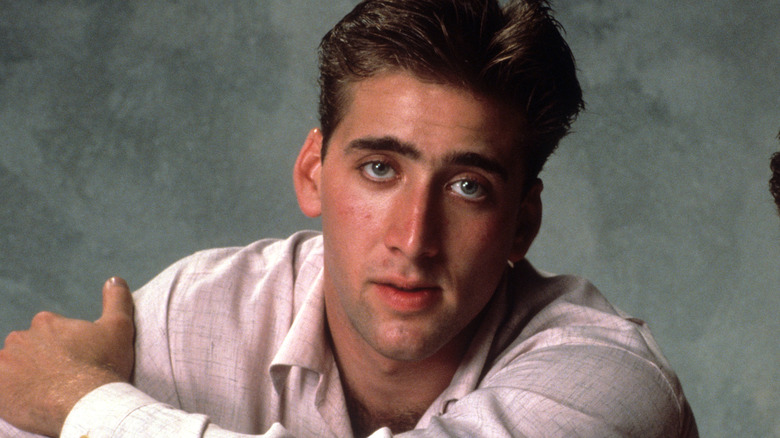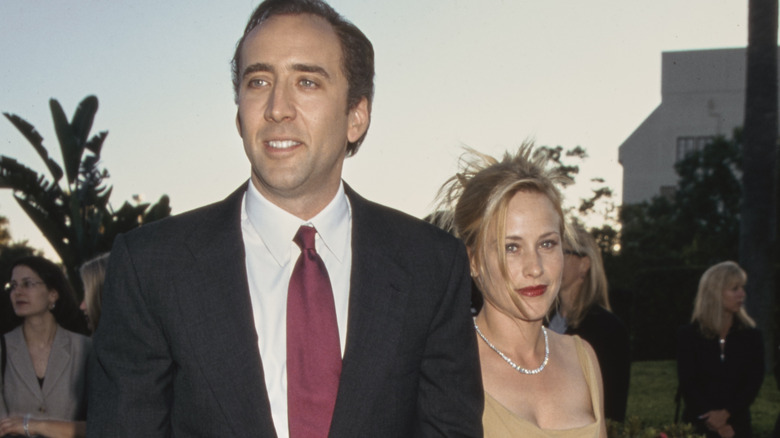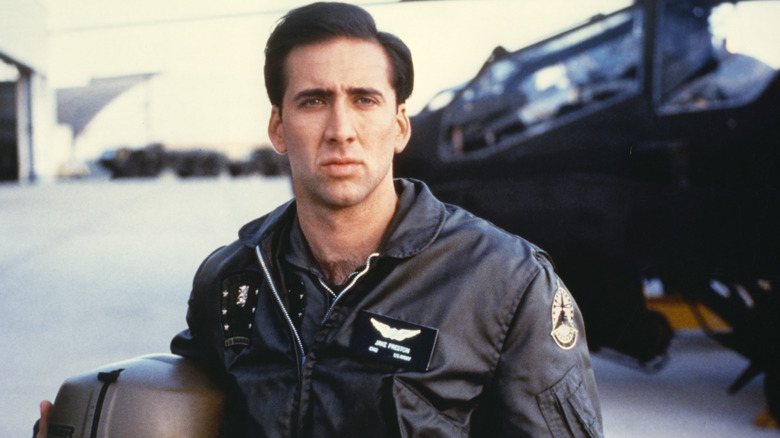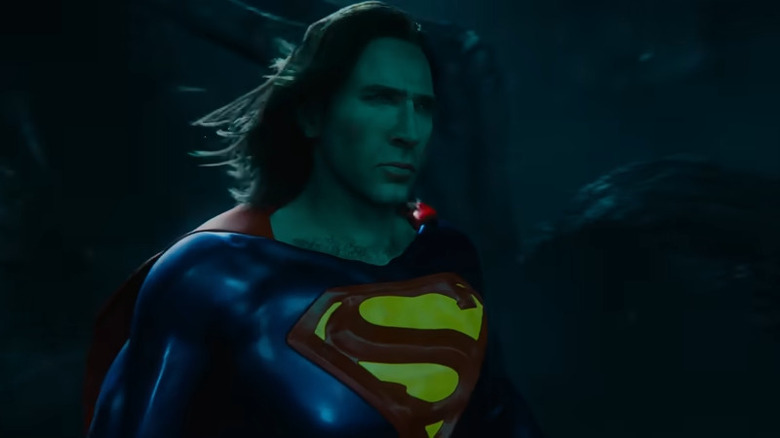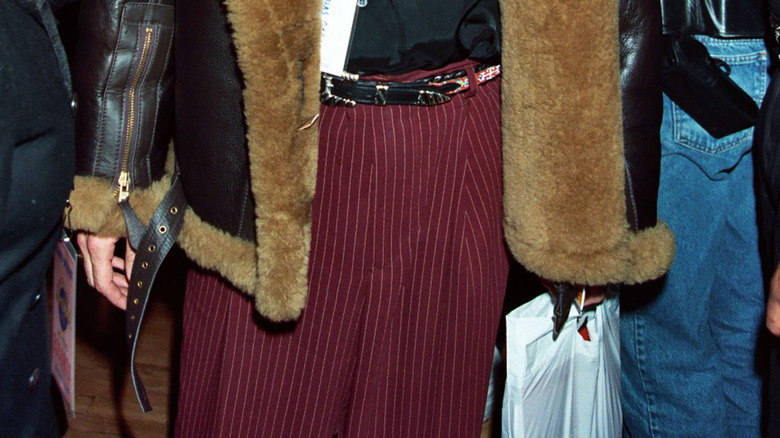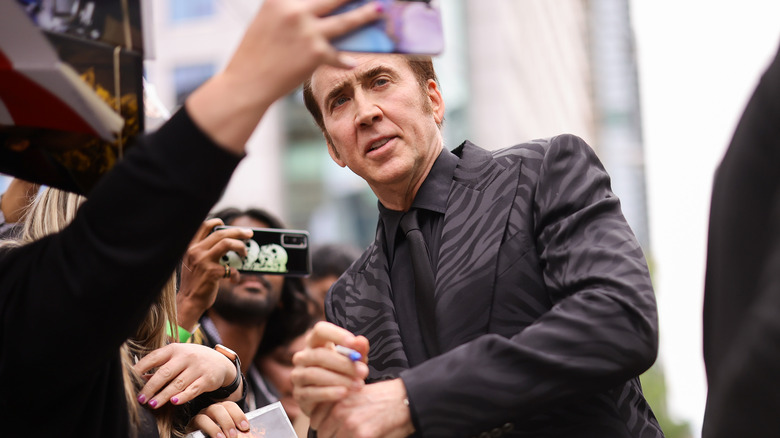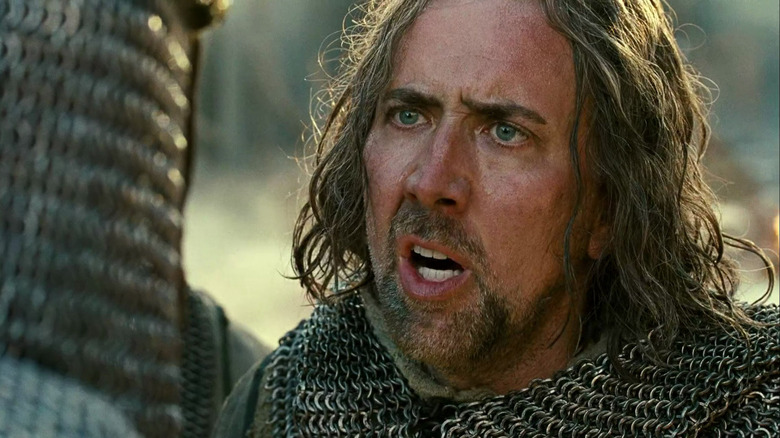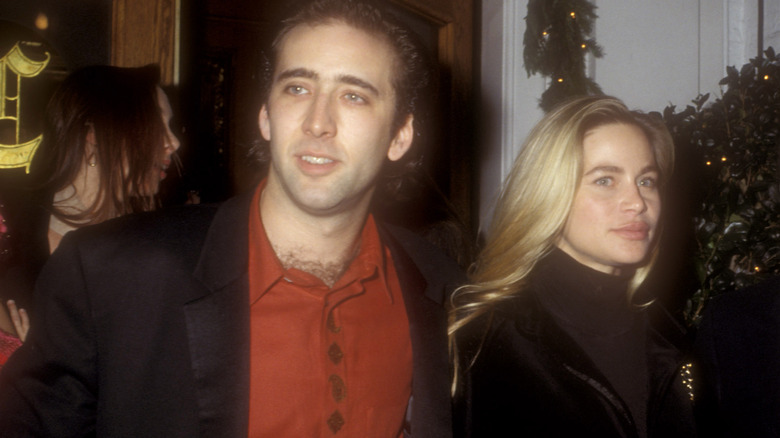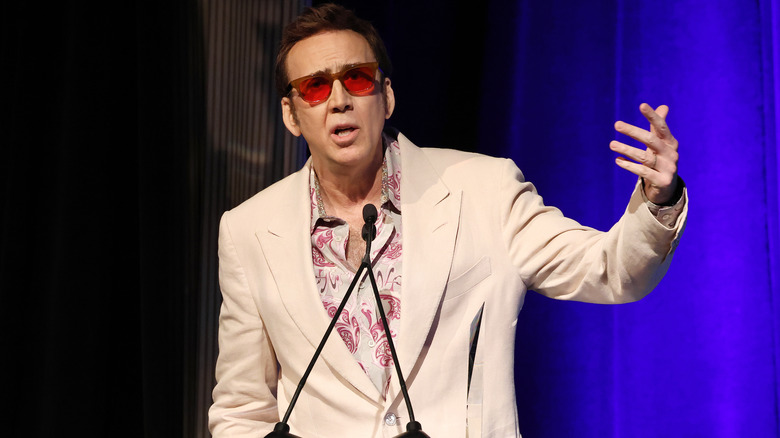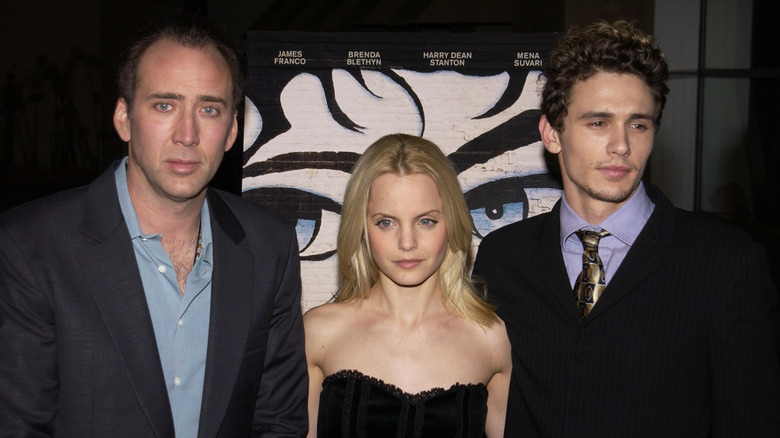Nicolas Cage's Tragic True Life Story
For the past 30 years, Nicolas Cage has been one of Hollywood's most audacious personalities, with a flair for off-the-wall roles and movies that match his occasionally over-the-top personality. The actor has earned a legion of fans, not just for his talent on screen, but for his down-to-earth demeanor off it. He's lived a rollercoaster life, full of highs and lows, and his frank, earnest interviews make him easy to get behind.
Following a string of blockbuster film roles, Cage became an international superstar. His success, as well as his famous family — he is the nephew of director Francis Ford Coppola — ensured he lived a privileged life. However, he's also faced lots of hardships and low points. Over the years, Cage has made disastrous mistakes, suffered personal loss and private pain, and has always owned up to the problems that were of his own making. From bad career moves to the many lawsuits he has faced and filed, this is the tragic true life story of Nicolas Cage.
He struggled to make a name for himself
The term "nepo baby" is getting a lot of attention these days — referring to children of celebrities who embark on the same career — but back when Nicolas Cage was getting his start in Hollywood it wasn't seen as such a bad thing to get a break because a parent or family member was a major star. When he was growing up as Nicolas Coppola, you'd think that he would have loved his connection to the famous filmmaker, Francis Ford Coppola, but that wasn't always the case. As a teenager, Cage begged his uncle for a shot but was rebuffed multiple times.
Forced to earn his way into the business, the young actor secured a small role in "Fast Times at Ridgemont High," but he was — by his admission – "the butt of jokes because my name was still Coppola" (per New York Magazine). As a result, Cage decided to change his name. To get out from the shadow of his family — and the weight of expectation that came with it – he took the surname "Cage," after Marvel superhero Luke Cage and composer John Cage. Eventually, Nicolas Cage would get his breakout roles, with "Peggy Sue Got Married" and "Raising Arizona," but it wasn't without a lot of early rejection.
Cage's many ill-fated marriages
Brief marriages, challenging courtships, and problematic relationships are par for the course in Hollywood, and Nicolas Cage is no exception. In the '90s, Cage was married to Patricia Arquette for over five years, but it was later revealed that their relationship had crumbled after just nine months — and they kept up appearances as a couple until their divorce was finalized years later.
While it appears their relationship broke down quickly, it took Cage five years to secure his marriage proposal to Arquette. At one point, she made a list of nearly impossible items for him to acquire to prove his love. This included a black orchid and the autograph of J.D. Salinger, which he somehow fulfilled — though it required bending a few rules, such as spraying a purple orchid with black paint.
Surprisingly, the nine-month romance with Arquette wasn't his shortest marriage. In August 2002, Cage married Elvis Presley's daughter Lisa Marie, but the two were divorced less than four months later, and his marriage to Erika Koike in 2019 lasted a mere four days.
A failed attempt at becoming an action hero
As Nicolas Cage's star power rose through the '80s following movies like "Moonstruck" and "Wild at Heart," Hollywood began to see him as a bonafide leading man. As a result, some thought he had the potential to be the next big-screen action hero. While he'd later earn that status with blockbusters like "The Rock" and "Con Air," Cage had to suffer through a failed early attempt that did a number on his career and his ego.
Released in 1990, "Fire Birds" was an obvious attempt to capitalize on the popularity of high-flying action movies like "Top Gun" and "Iron Eagle." In the film, Cage plays a helicopter pilot on a mission to take down a drug cartel in South America, and he's joined by an impressive supporting cast including Sean Young and Tommy Lee Jones.
That promise didn't translate to box office bucks, though, and Cage realized during production that he was completely wrong for the role of charismatic action hero. "I couldn't fit that bill," he said years later (via Entertainment Weekly). "I knew when the producers came into the trailer and said 'We want you to smile more' that I was miscast."
His fight to play a superhero
Nicolas Cage grew up on comic books — hence his choice of surname — and had a sincere love of superheroes all his life. As more comic book heroes made their way to the big screen, Cage had his sights set on playing one of them, with his greatest dream being to play Superman. Famously, he came quite close to playing the role when Tim Burton was hired to direct "Superman Lives" in the late '90s, but the project fell apart and never came to be.
In the following years, Cage would keep trying to get his comic book movie role. He was considered for "Iron Man" at one point and almost played Green Goblin in Sam Raimi's "Spider-Man." He was even officially signed on to play the title role in DC's "Constantine" before director Tarsem Singh abandoned the film. He'd finally get the superhero movie he'd been dreaming of when he was cast to play Johnny Blaze in 2007's "Ghost Rider." Unfortunately, this film was lambasted by critics — though it did scrape enough together to get a sequel.
Cage would go on to play Big Daddy in "Kick-Ass" in 2010 and Spider-Man Noir in 2018's "Spider-Man: Into the Spider-Verse." He eventually got his shot at Superman in 2018, voicing the character in "Teen Titans GO! To the Movies." This was followed by a cameo appearance in "The Flash" in 2023 as the "Superman Lives" incarnation of the character, bringing everything full circle.
An in-flight prank nearly led to his arrest
While not to the same extent as some of his contemporaries, Nicolas Cage has had some brushes with the law, and one ill-advised prank landed almost him in some serious hot water with authorities. Perhaps unsurprisingly, it involves his Hollywood friend Charlie Sheen — who absolutely is known for run-ins with police.
The incident happened circa 1991, and according to the actor, he was midway through a flight alongside Sheen when he got the wild idea to play a prank on his fellow passengers. Grabbing the intercom, Cage pretended to be the pilot and told the entire flight that he wasn't feeling well. The problem was more than just upsetting passengers, though, because his companion Sheen happened to be hiding a stash of drugs on his person which nearly got them both thrown in jail.
"[The pilot] pointed his finger at my face furiously, at which point the door to the aircraft swooshed open ... to reveal six fully-armed police officers," Cage revealed on the "Late Show with David Letterman" (via Digital Spy) in 2012. Thanks to a little smooth talking, Cage convinced them to let them go.
He outspent his own massive fortune
By the end of the 1990s, Nicolas Cage was one of the biggest stars in the world. He was starring in movie after movie and finally had the riches and fame that every actor dreams of when they're starting. In 2009, Cage was listed as one of the top five highest paid actors in Hollywood according to Forbes. Unfortunately, he didn't always spend his money wisely.
Cage went on a spending splurge that included purchasing six-figure dinosaur bones, a horde of expensive cars, four yachts, and even a haunted house. He seemed to enjoy collecting expensive and exotic pets, too, and his home zoo featured rare snakes, a shark, an octopus, and even an alligator.
His most famous purchases, though, were rare comic books, including "Action Comics" #1, the first appearance of Superman, which he acquired in 1997 for $150,000. It was later stolen from his home in 2000, but Cage would get the last laugh when it was recovered more than a decade later and he sold it at auction for an eye-popping $2.1 million. Despite this profit, Cage went into debt with his lavish spending, reportedly blowing as much as $150 million. This eventually landed him in some serious trouble with the IRS to the tune of more than $6 million in unpaid property taxes (per CNBC).
A rocky road through real estate investment
Around the same time Nicolas Cage was accruing debt due to his extravagant spending, the actor also got into further financial trouble while trying to supplement his income. Looking to broaden his money-making portfolio, the actor began dabbling in real estate investment, which often sounds like a sure thing to those with deep enough pockets. For Cage, it must have seemed like a no-brainer.
But things didn't go as planned. Instead of raking in millions, Cage was saddled with even more debt from bad investments and real estate opportunities that went belly up. "I was overinvested in real estate," Cage told 60 Minutes. "The real estate market crashed, and I couldn't get out in time." As detailed by ABC News, Cage owed a whopping $14 million to the IRS, which placed a lien on his investments and forced him to start paying up. He paid off what was owed, but it took him years to get out of the financial hole — a time the actor describes as a particularly dark period for him.
Reluctant roles he took on to pay off his debts
With his finances depleted, Nicolas Cage also wound up at a low point in his career. By the late 2000s he wasn't quite the box office draw he once was after flops like "Bangkok Dangerous" and "Next," so earning enough to get out of debt was going to take some extra work. That meant accepting just about any offer that came his way, including a string of awful movies that he would never have taken otherwise.
"Work was always my guardian angel," Cage told "60 Minutes" of this dark time when he reluctantly took roles in projects he knew would fail. Yet, Cage insists he never gave anything less than 100% in a performance and he stands by his work. "It may not have been blue chip, but it was still work," he admits. "Even if the movie ultimately is crummy, they know I'm not phoning it in, that I care every time." By the late 2010s, Cage was appearing in three, four, and sometimes five movies a year, most of which were critically derided flops.
"They didn't work, all of them," he told GQ. "Some of them were terrific, like 'Mandy,' but some of them didn't work." But doing all those movies helped him financially, and by 2022 he was free and clear with the IRS.
Cage's ex-wife sued for conservatorship over their son
Nicolas Cage has had some incredibly brief marriages that ended in heartbreak, but his most bitter breakup involves the mother of his first son, Weston. Married in 1988, Nicolas Cage and Christina Fulton were together until their divorce in 1990, during which time Weston was born. Unfortunately, the finalization of the divorce wasn't the end of his problems with Fulton, and decades later in 2009, she dropped a massive lawsuit on him after one of his homes went into foreclosure while he was struggling with massive debt.
The reason the lost home was a big deal is that Fulton claimed to be living in it. According to Fulton, she'd been awarded the home in their divorce as the home she raised their son in. At the time of the filing, Fulton was struggling with Weston, who had moved out but was undergoing psychiatric treatment following a violent public outburst (per CNN). For his part, Weston insisted that his involvement with his mother's lawsuit was nonexistent and that he had no desire for a relationship with her at all.
Despite Weston's statement, Fulton snapped back, alleging that her son was being manipulated by Cage, and she sought to have a conservatorship awarded over her son. The suit was settled in 2011 (per CNN).
More money, more lawsuits
Nicolas Cage's financial problems are well-documented in Hollywood. To the actor's credit, he never filed for bankruptcy and he managed to pay back all of his debts by taking on more work. That said, he didn't take sole responsibility for the issues he had with money, filing a lawsuit claiming that his manager was partly to blame.
In 2009, he filed a whopping $20 million lawsuit against Samuel J. Levin, accusing his financial manager of making excessively risky — and bad — investments that cost him tens of millions of dollars and contributed to his massive debt to the IRS. "[Levin] placed Cage in numerous highly speculative and risky real estate investments, resulting in Cage suffering catastrophic losses," stated the lawsuit (per The Standard). However, Levin countersued, insisting that the real fault lay with Cage himself for "compulsive, self-destructive spending." In 2012, the lawsuit was settled without heading before a judge.
Troubles with the law
Over the years, Nicolas Cage has had a few problems with the law. Most publicly was his arrest in 2011 following a bender in New Orleans that saw him publicly intoxicated during a confrontation with police (via The Guardian). It happened outside a local residence where he was said to be drunkenly arguing with his wife, Alice Kim. According to police reports, Cage grabbed Kim by the arm and began forcibly pulling her towards the residence, apparently a dispute over whether the home was the property they'd rented.
In a rage, Cage was reported to have struck various motor vehicles at the scene before attempting to flee in a nearby taxi. Upon seeing the disturbance, police ordered him out of the cab, but things didn't get any better. Rather than comply with police orders, Cage began taunting authorities, daring them to arrest him. The cops took him up on the dare and the actor spent some time in jail sobering up, while judges slapped him with several charges including disturbing the peace and public intoxication (per CNN).
While Cage's wife insisted she did not want any charges filed and denied claims that he'd assaulted her, Cage was also charged with abuse. All the charges were eventually dropped, but not before he made plenty of entertainment news columns for the unfortunate public display.
Troubles with domestic violence
A charge of domestic abuse may have been dropped by police in 2011, but this wasn't the only time Nicolas Cage was accused of bad behavior by the women in his life. In 2018, the actor was hit with claims that he'd been abusive to a former girlfriend, Vickie Park, whom he'd reportedly dated in 2017 following his divorce from Alice Kim (per The Independent). Those allegations, however, came about during a strange legal battle between Park and his ex-wife Kim, who Park claimed had been harassing her.
In the court filing for a restraining order against Kim, Park claimed that Cage suffered from "alcohol addiction, depression, and mental illness" which may have been the catalyst for a pattern of abuse. She mentioned an alleged incident that occurred at a film festival in Vienna, but the worst were allegations against Kim, who repeatedly insulted Park to Cage, and who she claimed was instigating violent encounters between them. "Her jealousy of my relationship with her ex-husband, my youth and physical appearance has drove [sic] her to take these actions of harassment," Park said in the filing. "Her intentions were to subject him into more alcohol abuse and anger towards me while I was alone with him in our hotel room in London, England — right after the abuse incident in Vienna, Austria." Cage and Kim both denied what they called "absurd allegations."
He was in hot water for copyright infringement
Nicolas Cage managed to settle lawsuits from his ex-wife and survive allegations of abuse from another former lover, but he faced another potential lawsuit over an indie movie he made in 2002. According to Variety – which covered the story as it was unfolding at the time — Cage barely escaped a copyright infringement suit over his film "Sonny," which he settled out of court. The film, which he both directed and had a small role in, starred James Franco and Mena Suvari and followed a disgraced veteran soldier whose mother wants him to return to the life of a male prostitute.
The suit was filed by Robert Dellinger – a TV writer from the 1970s who'd worked on shows like "Starsky and Hutch" — who claimed he'd contributed to the script. According to Dellinger, he'd collaborated with the film's sole-credited screenwriter John Carlen on many screenplays back in the '70s that eventually evolved into "Sonny." Seeking $2 million in damages, the case was settled with Dellinger stating, "I can't mention the amount, but it was healthy," while thanking Cage's side for doing the right thing.
